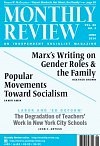Volume 66, Issue 02 (June)

Samir Amin’s Review of the Month in this issue, “Popular Movements Toward Socialism,” offers a masterful analysis of struggles all over the world in the era of what he calls “generalized-monopoly capitalism.” The most important theoretical innovation in his article, in our opinion, is his attempt to bring together a variety of global struggles under the rubric of the “movement toward socialism,” borrowing the terminology from the current practice of a number of South American parties: in Bolivia, Chile, and elsewhere. Movements that fall under this mantle, Amin suggests, may include those that seek to transcend capitalism, as well as others for which the object is more ambiguously a radical upending of labor-capital relations. | more…
The following reflections deal with a permanent and fundamental challenge that has confronted, and continues to confront, all popular movements struggling against capitalism. By this I mean both those of movements whose explicit radical aim is to abolish the system based on private proprietorship over the modern means of production (capital) in order to replace it with a system based on workers’ social proprietorship, and those of movements which, without going so far, involve mobilization aimed at real and significant transformation of the relations between labor (“employed by capital”) and capital (“which employs the workers”).… Taken as a whole, many of these movements can be termed “movements toward socialism.” | more…
The Degradation of Teachers’ Work through Standardized Testing and the New York City Evaluation System
The biggest threat to education today is the corporate education reform movement—what many of us call “Ed Deform.” It is also the biggest threat to teachers’ working conditions. Changes in education legislation are creating new government-funded markets for education entrepreneurs. Spending is being shifted away from teacher salaries, benefits, and pensions and into standardized tests, curriculum, and technology. To maximize this investment opportunity teachers must be reskilled away from deciding on content, assessing students, and tailoring education to meet diverse students’ needs and interests. This reduces the room for teachers to implement, for example, the demands of anti-racist advocates and concerned parents for “culturally relevant curriculum” or, indeed, anything that deviates from relevant test-prep skills. Standardized test scores provide a simple metric for measuring “productivity” against teacher labor costs. One example of this Taylorist dynamic is New York City’s new “Advance” Teacher Evaluation system. | more…
In recent years, there has been little discussion of Marx’s writings on gender and the family, but in the 1970s and ’80s, these writings were subject to a great deal of debate. In a number of cases, elements of Marx’s overall theory were merged with psychoanalytic or other forms of feminist theory….These scholars viewed Marx’s theory as primarily gender-blind and in need of an additional theory to understand gender-relations as well. However, they retained Marx’s historical materialism as a starting point for understanding production. Moreover, a number of Marxist feminists also made their own contributions in the late 1960s to ’80s, particularly in the area of political economy [when they] tried to revalue housework. [Others] attempted to move beyond dual systems towards a unitary understanding of political economy and social reproduction [or show] that Marx can be used to understand the historical development of women’s nature. | more…
Rupert Murdoch is unquestionably the single most important media figure of our times. He is a dominant force in the journalism and politics of the United States, the United Kingdom, and Australia. Whether the world would be the same with some other person playing the same role had he never been born is an academic matter. In this world, Murdoch controls a vast media empire, which pushes his political agenda and his commercial ambitions. One studies Murdoch much like one studies Rommel: in awe of the vision but petrified by the consequences of his actions. | more…
